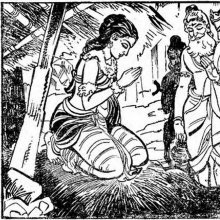Ash, Aṣ, Aś, Ās, As: 16 definitions
Introduction:
Ash means something in Hinduism, Sanskrit, biology, Tamil. If you want to know the exact meaning, history, etymology or English translation of this term then check out the descriptions on this page. Add your comment or reference to a book if you want to contribute to this summary article.
The Sanskrit terms Aṣ and Aś can be transliterated into English as As or Ash, using the IAST transliteration scheme (?).
Images (photo gallery)
(+1536 more images available)
In Hinduism
Vyakarana (Sanskrit grammar)
Source: Wikisource: A dictionary of Sanskrit grammar1) Aś (अश्).—Pratyāhāra or a brief term standing for all vowels, semivowels, and the fifth, fourth and third of the class-consonants; all letters excepting the surds and sibilants;
2) Aś.—Substitute अ (a) for the word इदम् (idam) before affixes of cases beginning with the instrumental, and for एतद् (etad) before the tad. affixes त्र (tra) and तस् (tas); see P.II.4.32 and 33;
3) Aś.—Substitute अ (a) for the gen. sing. case-affix ङस् (ṅas) after the words युष्मद् (yuṣmad) and अस्मद् (asmad); see P.VII.1.27.
Source: Wikisource: A dictionary of Sanskrit grammar1) As (अस्).—Case affix of the nominative and accusative plural and the ablative and genitive singular (जस्, शस्, ङसि (jas, śas, ṅasi) and ङस् (ṅas))
2) As.—Taddhita affix अस् (as) (असि (asi)) added to पूर्व, अधर (pūrva, adhara) and अवर (avara), by P.V.3.39:
3) As.—Compoundending अस् (as) (असिच् (asic)) applied to the words प्रजा (prajā) and मेधा (medhā) standing at the end of a Bahuvrīhi compound (P.V.4.122):
4) As.—Uṇādi affix अस् (as) prescribed by the rule सर्वधातुभ्योऽसुन् (sarvadhātubhyo'sun) and subsequent rules (628-678) to form words such as मनस्,सरस् (manas, saras) etc.
5) As.—Ending syllable अस् (as), with or without sense, of words in connection with which special operations are given in grammar; cf. P.VI.4.14; cf. also अनिनस्मन्ग्रहणान्यर्थवता चानर्थकेन च तदन्तविधिं प्रयोजयन्ति (aninasmangrahaṇānyarthavatā cānarthakena ca tadantavidhiṃ prayojayanti) Par.Śek. Pari. 16.

Vyakarana (व्याकरण, vyākaraṇa) refers to Sanskrit grammar and represents one of the six additional sciences (vedanga) to be studied along with the Vedas. Vyakarana concerns itself with the rules of Sanskrit grammar and linguistic analysis in order to establish the correct context of words and sentences.
Yoga (school of philosophy)
Source: ORA: Amanaska (king of all yogas): A Critical Edition and Annotated Translation by Jason BirchAsh (for spiritual purposes) is denoted by the Sanskrit term Bhasman, according to the Amanaska Yoga treatise dealing with meditation, absorption, yogic powers and liberation.—Accordingly, as Īśvara says to Vāmadeva: “[...] Putting on ochre garments, carrying a skull, plucking out clumps of hair, maintaining non-vedic religious observances, ashes (bhasman), ascetic clothing and matted locks, behaving as if mad, [the ascetic practice of] nakedness, [studying] the Vedas, Tantras and so on and the meeting [of learned people] for [reciting] poetry in the assembly: All [this] is exertion for the sake of filling one's stomach and is not the cause of the highest good. [...]”.

Yoga is originally considered a branch of Hindu philosophy (astika), but both ancient and modern Yoga combine the physical, mental and spiritual. Yoga teaches various physical techniques also known as āsanas (postures), used for various purposes (eg., meditation, contemplation, relaxation).
Shaktism (Shakta philosophy)
Source: ORA: Amanaska (king of all yogas): (shaktism)Ash (from the cremation ground) is denoted by the Sanskrit term Bhasman, according to the 17th century Kaulagajamardana (“crushing the Kaula elephant”) authored by Kāśīnātha or Kṛṣṇānandācala.—Accordingly, [as Īśvara said to Pārvatī]: “Listen, O Pārvatī, I shall give a critique of the Pāṣaṇḍas. Knowing this, a wise man is not defeated by them. [...] He who wears ash (bhasman) from the cremation ground and delights in wine and flesh; he who performs such [rites] as bathing and the junctures for [mere] worldly rewards; and he who is the vilest [of them all,] having become a hater of Viṣṇu, destroys everything; [all of them] are called Pāṣaṇḍas. [Now,] my dear, hear about the Kāpālika. [...]”

Shakta (शाक्त, śākta) or Shaktism (śāktism) represents a tradition of Hinduism where the Goddess (Devi) is revered and worshipped. Shakta literature includes a range of scriptures, including various Agamas and Tantras, although its roots may be traced back to the Vedas.
Biology (plants and animals)
Source: Wisdom Library: Local Names of Plants and DrugsAsh in the Hindi language is the name of a plant identified with Fraxinus floribunda Wall. from the Oleaceae (Jasmine) family having the following synonyms: Ornus urophylla, Ornus floribunda, Fraxinus urophylla. For the possible medicinal usage of ash, you can check this page for potential sources and references, although be aware that any some or none of the side-effects may not be mentioned here, wether they be harmful or beneficial to health.
As in the Urdu language is the name of a plant identified with Myrtus communis L. from the Myrtaceae (Bottlebrush) family.
Source: Google Books: CRC World Dictionary (Regional names)Ash in North America is the name of a plant defined with Fraxinus pennsylvanica in various botanical sources. This page contains potential references in Ayurveda, modern medicine, and other folk traditions or local practices It has the synonym Calycomelia campestris (Britton) Nieuwl. & Lunell (among others).
Example references for further research on medicinal uses or toxicity (see latin names for full list):
· N. Amer. Trees (1908)
· Naturaliste Canad. (1966)
· Trans. Kansas Acad. Sci. (1938)
· American Midland Naturalist (1916)
· Rhodora (1947)
· Rhodora (1938)
If you are looking for specific details regarding Ash, for example diet and recipes, chemical composition, health benefits, side effects, extract dosage, pregnancy safety, have a look at these references.

This sections includes definitions from the five kingdoms of living things: Animals, Plants, Fungi, Protists and Monera. It will include both the official binomial nomenclature (scientific names usually in Latin) as well as regional spellings and variants.
Languages of India and abroad
Sanskrit dictionary
Source: DDSA: The practical Sanskrit-English dictionaryAś (अश्).—I. 5 A. [अश्नुते, आनशे, आशिष्ट-आष्ट, अशिता-अष्टा, अशिष्यते-अक्ष्यते, अशितुम्-अष्टुम्, अशित-अष्ट (aśnute, ānaśe, āśiṣṭa-āṣṭa, aśitā-aṣṭā, aśiṣyate-akṣyate, aśitum-aṣṭum, aśita-aṣṭa)]
1) To pervade, fill completely, penetrate; खं प्रावृषेण्यैरिव चानशेऽब्दैः (khaṃ prāvṛṣeṇyairiva cānaśe'bdaiḥ) Bhaṭṭikāvya 2.3; सदिगश्नुवानमिव विश्वमोजसा (sadigaśnuvānamiva viśvamojasā) Kirātārjunīya 12.21; Śiśupālavadha 17. 46.65;
2) To reach, go or come to, arrive at, attain to; नैष्कर्म्यं पुरुषोऽश्नुते (naiṣkarmyaṃ puruṣo'śnute) Bhagavadgītā (Bombay) 3.4; सर्वमानन्त्यमश्नुते (sarvamānantyamaśnute) Y.1.261.
3) To get, gain, obtain, enjoy, experience; अत्युत्कटैः पापपुण्यैरिहैव फलमश्नुते (atyutkaṭaiḥ pāpapuṇyairihaiva phalamaśnute) H.1.8; उदयमस्तमयं च रघू- द्वहादुभयमानशिरे वसुधाधिपाः (udayamastamayaṃ ca raghū- dvahādubhayamānaśire vasudhādhipāḥ) R.9.9; न वेदफलमश्नुते (na vedaphalamaśnute) Manusmṛti 1.19; 4.149;5.46; अर्थज्ञ इत्सकलं भद्रमश्नुते (arthajña itsakalaṃ bhadramaśnute) Nir.; फलं दृशोरानशिरे महिष्यः (phalaṃ dṛśorānaśire mahiṣyaḥ) N.6.43; Bhagavadgītā (Bombay) 3.4; 5.21; Bhaṭṭikāvya 3.37;5.14; 14.19.
4) To become master of; to master, to be able (Ved.).
5) To heap, accumulate. With [anu 1] To reach, come up to.
2) to equal.
-ā 1 to reach to.
2) to obtain, get.
3) to addict oneself to.
-ud 1 to reach to the top of.
2) to reach, obtain, get
3) to be master of.
-upa 1 to obtain, enjoy, acquire. न च लोकानुपाश्नुते (na ca lokānupāśnute) Mb.; क्रियाफलमुपाश्नुते (kriyāphalamupāśnute) Manusmṛti 6.82,12.2,81.
2) to become master of.
-pari to reach, attain; fill competely, pervade.
-pra to arrive at, reach, occupy; fill completely.
2) to fall to the lot of one (acc.). -II. 9. P. (rarely A.) [अश्नाति, आशीत्, आश, अशिता, अशिष्यति, अशित (aśnāti, āśīt, āśa, aśitā, aśiṣyati, aśita)]
1) To eat, to consume; निवेद्य गुरवेऽश्नीयात् (nivedya gurave'śnīyāt) Manusmṛti 2. 51; अश्नीमहि वयं भिक्षाम् (aśnīmahi vayaṃ bhikṣām) Bhartṛhari 3.117.
2) To taste, enjoy; यद्ददाति यदश्नाति तदेव धनिनो धनम् (yaddadāti yadaśnāti tadeva dhanino dhanam) H.1.143-44; अश्नन्ति दिव्यान् दिवि देवभोगान् (aśnanti divyān divi devabhogān) Bhagavadgītā (Bombay) 9.2; प्रत्यक्षं फलमश्नन्ति कर्मणाम् (pratyakṣaṃ phalamaśnanti karmaṇām) Mb. -Caus. (āśayati) To feed, give to eat, cause to eat or drink (with acc. of person); आशयच्चामृतं देवान् (āśayaccāmṛtaṃ devān) Sk.; Manusmṛti 3.83, 94,219,22; (for derivatives from the causal see under ā). -With [ati] to precede or surpass in eating.
-upa to eat; taste, enjoy.
--- OR ---
Aṣ (अष्).—1 U. [अषति-ते, अषितुम् (aṣati-te, aṣitum)]
1) To shine.
2) To go, move.
3) To receive, take (trans.).
--- OR ---
As (अस्).—I. 2 P. [अस्ति, आसीत्, अस्तु, स्यात् (asti, āsīt, astu, syāt); defective in non-conjugational tenses, its forms being made up from the root भू (bhū).]
1) To be, live, exist (showing mere existence); नासदासीन्नो सदासीत् (nāsadāsīnno sadāsīt) Ṛgveda 1.129.1; आत्मा वा इदमेक एवाग्र आसीत् (ātmā vā idameka evāgra āsīt) Ait. Up.1.1. श्रुतिद्वैधं तु यत्र स्यात् (śrutidvaidhaṃ tu yatra syāt) Manusmṛti 2.14; शपथे नास्ति पातकम् (śapathe nāsti pātakam) 8.112; न त्वेवाहं जातु नासम् (na tvevāhaṃ jātu nāsam) Bhagavadgītā (Bombay) 2.12; आसीद्राजा नलो नाम (āsīdrājā nalo nāma) Nala. 1.1; Manusmṛti 5.79; न अस् (na as) not to be, to be lost, disappear, perish, नायमस्तीति दुःखार्ता (nāyamastīti duḥkhārtā) Nala.7.16; अस्ति भोक्तुम् (asti bhoktum) Sk. it has to be eaten; (for other uses of asti see asti s. v.).
2) To be (used as a copula or verb of incomplete predication, being followed by a noun or adjective or adverb; or some other equivalent); भक्तोऽसि मे सखा च (bhakto'si me sakhā ca) Bhagavadgītā (Bombay) 4.3; धार्मिके सति राजनि (dhārmike sati rājani) Manusmṛti 11.11; आचार्ये संस्थिते सति (ācārye saṃsthite sati) 5.8; so एवमेव स्यात्, तूष्णीमासीत् (evameva syāt, tūṣṇīmāsīt) &c.
3) To belong to, be in the possession of (expressed in English by have), with gename of possessor; यन्ममास्ति हरस्व तत् (yanmamāsti harasva tat) Pañcatantra (Bombay) 4.76; यस्य नास्ति स्वयं प्रज्ञा (yasya nāsti svayaṃ prajñā) 5.7; न हि तस्यास्ति किंचित् स्वम् (na hi tasyāsti kiṃcit svam) Manusmṛti 8.417; नास्ति बुद्धिरयुक्तस्य (nāsti buddhirayuktasya) Bhagavadgītā (Bombay) 2.66.
4) To fall to the share of, to happen to or befall anyone (with gen.); यदिच्छामि ते तदस्तु (yadicchāmi te tadastu) Ś.4. तस्य प्रेत्य फलं नास्ति (tasya pretya phalaṃ nāsti) Manusmṛti 3.139 he cannot enjoy or get.
5) To arise, spring out, occur; आसीच्च मम मनसि (āsīcca mama manasi) K.142 (this) occurred to my mind.
6) To become; तां दृष्ट्वा दशविस्तारामासं विंशतियोजनः (tāṃ dṛṣṭvā daśavistārāmāsaṃ viṃśatiyojanaḥ) Rām.; also शुक्लीस्यात् राजसात् स्यात् (śuklīsyāt rājasāt syāt) &c. Sk.
7) To lead or tend to, turn out or prove to be (with dat.); स स्थाणुः स्थिरभक्ति- योगसुलभो निःश्रेयसायास्तु वः (sa sthāṇuḥ sthirabhakti- yogasulabho niḥśreyasāyāstu vaḥ) V.1.1; संगतं श्रीसरस्वत्योर्भूतयेऽस्तु सदा सताम् (saṃgataṃ śrīsarasvatyorbhūtaye'stu sadā satām) 5.24; oft. with dat. alone without अस् (as); यतस्तौ स्वल्पदुःखाय (yatastau svalpaduḥkhāya) Pañcatantra (Bombay) 1.
8) To suffice (with dat.); सा तेषां पावनाय स्यात् (sā teṣāṃ pāvanāya syāt) Manusmṛti 11.85; अन्यैर्नृपालैः परिदीयमानं शाकाय वा स्याल्लवणाय वा स्यात् (anyairnṛpālaiḥ paridīyamānaṃ śākāya vā syāllavaṇāya vā syāt) Jagannātha.
9) To stay, reside, dwell, live हा पितः क्वासि हे सुभ्रु (hā pitaḥ kvāsi he subhru) Bhaṭṭikāvya 6.11.
1) To take place, happen.
11) To be in a particular relation, to be affected (with loc.); किं नु खलु यथा वयमस्यामेवमियम- प्यस्मान् प्रति स्यात् (kiṃ nu khalu yathā vayamasyāmevamiyama- pyasmān prati syāt) Ś.1. अस्तु (astu) well, let it be; एवमस्तु, तथास्तु (evamastu, tathāstu) so be it, amen. The form आस (āsa) joined to roots in forming their periphrastic perfect is sometimes separated from the root and used by itself; तं पातयां प्रथममास पपात पश्चात् (taṃ pātayāṃ prathamamāsa papāta paścāt) R.9.61,16.86. [cf. L. est and Gr. esti. with अस्ति (asti); esse; Zend. āsti; Pers. hast, ast] With अति (ati) to be over, excel, surpass.
-anu to be at hand; reach.
-api (with loc. or an adv. of place)
1) to be in anything.
2) to belong to, be closely connected with.
-abhi 1 to belong to, to fall to one's share; यन्मममाभि- ष्यात् (yanmamamābhi- ṣyāt) Sk.
2) to be over.
3) to excel, surpass.
4) to domineer or to tyrannize over, rule over.
-āvis to arise, spring up, be visible; आचार्यकं विजयि मान्मथ- माविरासीत् (ācāryakaṃ vijayi mānmatha- māvirāsīt) Mālatīmādhava (Bombay) 1.26.
-upa to be near to or in.
-pari 1 to be in the way.
2) to surpass.
3) to pass or spend (time).
4) to pervade.
-pra 1 to be in front of.
2) to be in extraordinary degree, to preponderate, excel, surpass.
-prati 1 to be equal to, be a match for.
2) to rival, emulate, vie with.
3) to be a representative of, stand in place of.
-prādus to appear, spring up; प्रादुरासीत्तमोनुदः (prādurāsīttamonudaḥ) Manusmṛti 1.6; R.11.15.
-vyati (Atm. vyatihe, vyatise; vyatiste) to excel, surpass, be above or superior to, out-weigh; अन्यो व्यतिस्ते तु ममापि धर्मः (anyo vyatiste tu mamāpi dharmaḥ) Bhaṭṭikāvya 2.35.
-as II.4. P. (asyati, āsa, āsthat, asitum, asta)
1) To throw, cast, hurl, discharge, shoot (with loc. of the mark); हस्ते बिभर्ष्यस्तवे (haste bibharṣyastave) Śvet. Up.3.6; तस्मिन्नास्थदिषीकास्त्रम् (tasminnāsthadiṣīkāstram) R.12.23; Bhaṭṭikāvya 15.91, 14.77; sometimes with dat. or gen. दस्यवे हेतिमस्य (dasyave hetimasya) Ṛgveda 1.13.3.
2) To drive away, remove.
3) To frighten or scare away.
4) To throw or take away, let go, leave, give up; as in अस्तमान, अस्तशोक, अस्तकोप (astamāna, astaśoka, astakopa) see अस्त (asta).
5) To fight with; युयोध बलिरिन्द्रेण तारकेण गुहोऽ- स्यत (yuyodha balirindreṇa tārakeṇa guho'- syata) Bhāgavata 8.1.28. -With अति (ati) to shoot beyond or at, overpower (with arrows); अत्यस्त (atyasta) having shot beyond, having surpassed or excelled; joined in acc. (Tat. comp.; P.II.1.24.)
-abhipra to throw over or upon, hurl at.
-parini to stretch.
-as III. 1 U (asati-te, asita).
1) To go.
2) To take or receive, seize.
3) To shine (The examples usually cited to illustrate this sense are:- niṣprabhaśca prabhūrāsa bhūbhṛtām R.11.81; tenāsa lokaḥ pitṛmān vinetrā 14.23; lāvaṇya utpādya ivāsa yatnaḥ Kumārasambhava 1.35. But the sense of didīpe or 'shone' is far-fetched, though Vāmana is disposed to take it. It seems preferable to regard āsa in these instances as equivalent to babhūva, either taking it, as Śākaṭāyana does, as an indeclinable tiḍantaprati- rūpakamavyayam, or considering it, as Vallabha does, as an ungrammatical form used against the rules of grammar, prāmādikaḥ prayogaḥ; see Malli. on Kumārasambhava 1.35).
--- OR ---
Ās (आस्).—ind. An interjection, implying (a) Recollection; आः उपनयतु भवान् भूर्जपत्रम् (āḥ upanayatu bhavān bhūrjapatram) V.2. (b) Anger; आः कथमद्यापि राक्षसत्रासः (āḥ kathamadyāpi rākṣasatrāsaḥ) Uttararāmacarita 1; आः पापे तिष्ठ तिष्ठ (āḥ pāpe tiṣṭha tiṣṭha) Mālatīmādhava (Bombay) 8. (c) Pain; आः शीतम् (āḥ śītam) K. P.1. (d) Angry contradiction (apākaraṇa); आः क एष मयि स्थिते (āḥ ka eṣa mayi sthite) Mu.1; आः वृथामङ्गल पाठक (āḥ vṛthāmaṅgala pāṭhaka) Ve.1. (e) Sorrow, regret; विद्यामातरमाः प्रदर्श्य नृपशून् भिक्षामहे निस्त्रपाः (vidyāmātaramāḥ pradarśya nṛpaśūn bhikṣāmahe nistrapāḥ) Udb.; (āḥ smaraṇe'pākaraṇe kopasaṃtāpayostathā Med.).
Derivable forms: āḥ (आः).
--- OR ---
Ās (आस्).—I. 2 Ā. (āste, āsāṃcakre, āsiṣṭa; āsitum, āsita)
1) To sit, lie, rest; Bhagavadgītā (Bombay) 2.45; एतदासनमास्यताम् (etadāsanamāsyatām) V.5; आस्यता- मिति चोक्तः सन्नासीताभिमुखं गुरोः (āsyatā- miti coktaḥ sannāsītābhimukhaṃ guroḥ) Manusmṛti 2.193.
2) To live, dwell; तावद्वर्षाण्यासते देवलोके (tāvadvarṣāṇyāsate devaloke) Mb.; यत्रास्मै रोचते तत्रायमास्ताम् (yatrāsmai rocate tatrāyamāstām) K.196; कुरूनास्ते (kurūnāste) Sk.; यत्रामृतास आसते (yatrāmṛtāsa āsate) Ṛgveda 9.15.2; Bhaṭṭikāvya 4.6,8.79.
3) To sit quietly, take no hostile measures, remain idle; आसीनं त्वामुत्थापयति द्वयम् (āsīnaṃ tvāmutthāpayati dvayam) Śiśupālavadha 2.57.
4) To be, exist.
5) To be contained in; जगन्ति यस्यां सविकाशमासत (jaganti yasyāṃ savikāśamāsata) Śiśupālavadha 1.23.
6) To abide, remain, continue or be in any state, be doing anything, last; oft. used with present participles to denote a continuous or uninterrupted action; विदारयन्प्रगर्जंश्चास्ते (vidārayanpragarjaṃścāste) Pañcatantra (Bombay) 1 kept on, continued, tearing up and bellowing; used in this sense also with an adj., subst., indeclinable, past part., an adverb (tūṣṇīm &c.), or with the instr. of a noun; सुखेनास्ते (sukhenāste) &c.
7) To lead to, result in (with dat.); आस्तां मानसतुष्टये सुकृतिनां नीतिर्नवोढेव वः (āstāṃ mānasatuṣṭaye sukṛtināṃ nītirnavoḍheva vaḥ) H.1.185
8) To cease, have an end.
9) To solemnize, celebrate.
1) To let go, lay or put aside; आस्तां तावत् (āstāṃ tāvat) let it aside, let it go, to say nothing of, not to mention; K.18.
11) To be indifferent; ननु आस्ते इत्युपवेशने भवति । नावश्यमुपवेशने एव, औदासीन्येऽपि दृश्यते (nanu āste ityupaveśane bhavati | nāvaśyamupaveśane eva, audāsīnye'pi dṛśyate) | ŚB. on MS.3.6.24. -Caus. To cause to sit, seat, fix; आसयत्सलिले पृथ्वीम् (āsayatsalile pṛthvīm) Sk. Desid. आसिसिषते (āsisiṣate) To wish to sit &c. -II.4. P. [आस्यति, आसितुम् (āsyati, āsitum)]
1) To enclose; border.
2) To admit (as water) into.
Source: Cologne Digital Sanskrit Dictionaries: Shabda-Sagara Sanskrit-English DictionaryAś (अश्).—[aśa] r. 5th cl. (ū) aśū (aśnute) 1. To pervade or occupy. 2. To heap or crowd. r. 9th cl. (aśnāti) To eat, to eat hungrily. With pra prefixed, to begin to eat.
--- OR ---
Aṣ (अष्).—[aṣa] r. 1st cl. (asati-te) 1. To go or move. 2. To take or receive. 3. To shine: see asa.
--- OR ---
As (अस्).—[(ña)] r. 1st. cl. (asati-te) 1. To go or move. 2. To take or receive. 3. To shine. (la) r. 2d cl. (asti) To be. (ya, u, ir) r. 4th cl. (asyati-te) To throw or direct. With anu prefixed, to sit down: with apa, to quit or abandon: with ni, to deposit: with nir, to expel: with pari and upa, to sit around: with pra, to throw away, to reject, to confute: with vi, to divide: with vi and āṅ, to class, to arrange: with sam and ni, to abandon the world: with sam, to collect, to combine or compound.
--- OR ---
Ās (आस्).—[āsa] r. 2d cl. (āste or āsste) 1. To sit. 2. To be present. 3. To be or exist. With adhi prefixed. 1. To inhabit, to dwell in. 2. To sit over or upon. 3. To mistake or err by taking one thing for another from similarity of appearance. With abhi, to sit or apply to, to study, to learn. With ut, 1. To leave, to abandon. 2. To shake, agitate, &c. (as wind.) With upa, to worship, to do homage. With nir, to expel. With pra and nir, to reject, to refute, to invalidate.
Source: Cologne Digital Sanskrit Dictionaries: Benfey Sanskrit-English DictionaryAś (अश्).—ii. 5, aśnu. [Ātmanepada.] 1. To pervade, to occupy, [Yājñavalkya, (ed. Stenzler.)] 1, 260. 2. To attain, [Vedāntasāra, (in my Chrestomathy.)] in
— With the prep. upa upa, To attain, [Mānavadharmaśāstra] 6, 82.
— With vi vi, To pervade, [Raghuvaṃśa, (ed. Stenzler.)] 4, 15.
— With sam sam, To attain, Man, 2, 233.
--- OR ---
Aś (अश्).—ii. 9, aśnā, nī, [Parasmaipada.] (in epic poetry also [Ātmanepada.] Mahābhārata 3, 14686) 1. To eat, [Mānavadharmaśāstra] 1, 95. an-aśnāna, Not eating,
— With the prep. ati ati, To eat before another, Mahābhārata 3, 14686.
— With upa upa. 1. To eat up, to consume, [Devīmāhātmya, (ed. Poley.)] 5, 61. 2. To enjoy, [Rāmāyaṇa] 1, 62, 6. upāśnīyāt, instead of ºśnīyº, on account of the metre, Mahābhārata 12, 3266.
— With samupa sam-upa, To enjoy, Mahābhārata 3, 12631.
— With pari pari, To eat, Mahābhārata 3, 13354.
— With pra pra. 1. To begin eating, [Rāmāyaṇa] 3, 63, 28. 2. To take in the mouth only, [Mānavadharmaśāstra] 2, 62. 3. To eat, [Mānavadharmaśāstra] 5, 103. 4. To drink,
— With sam sam, To eat, [Pañcatantra] iv. [distich] 84.
--- OR ---
Aṣ (अष्).—i. 1, [Parasmaipada.] [Ātmanepada.] 1. To go. 2. To take. 3. To shine (v. r. as, cf. 3. as).
--- OR ---
As (अस्).—ii. 2, [Parasmaipada.] ([Ātmanepada.] when combined with vi-ati and as anxiliary vb.; e. g. sṛṣṭāḥ smake, Mahābhārata 13, 13). 1. To exist, [Bhagavadgītā, (ed. Schlegel.)] 2, 12. 2. To be, [Mānavadharmaśāstra] 1, 5; with an adv., Mahābhārata 3, 4041; with participles, [Mānavadharmaśāstra] 8, 94. asti, So it is, [Śākuntala, (ed. Böhtlingk.)] 14, 16. asti, Once, [Pañcatantra] 132, 22. With na, Not, it implies very often ‘to be lost,’ e. g. Mahābhārata 3, 10284. 3. With a gen. To belong. kasyāsi, Whose are you, [Nala] 12, 118. santi me, I have, [Mānavadharmaśāstra] 8, 87. tavāsmi, I am thy captive, [Mānavadharmaśāstra] 7, 91. 4. With a dat. To suffice, [Mānavadharmaśāstra] 11, 85. 5. With a loc. or with prati, To be affected against, [Śākuntala, (ed. Böhtlingk.)] 17, 13; 14. Sant, participle of the present (cf. [Latin] præ-sens), 1. Being, [Hitopadeśa] i. [distich] 75. 2. Being in the true sense of the word, Right, Bhāṣāp. 138. 3. Virtuous,
--- OR ---
As (अस्).—i. 4, [Parasmaipada.] 1. To throw, [Rāmāyaṇa] 2, 67, 18. 2. To leave, [Kathāsaritsāgara, (ed. Brockhaus.)] 6, 141. Aor. āstham, [Raghuvaṃśa, (ed. Stenzler.)] 12, 23. [particle.] of the perf. pass. asta (asita, [Rāmāyaṇa] 4, 13, 54).
— With the prep. ati ati, To surpass, [Rāmāyaṇa] 2, 23, 37.
— With vyati vi-ati, To cross, [Mānavadharmaśāstra] 2, 72.
— With apa apa. 1. To drive away, [Amaruśataka, (ed. Calcutt.)] 2. 2. To put off, [Nalodya, (ed. Benary.)] 3, 8. 3. To lay aside, [Rāmāyaṇa] 2, 32, 30. 4. To leave, [Pañcatantra] [prologue.] [distich] 10. Abeolutive apāsya, Except, [Hitopadeśa] iii. [distich] 139.
— With abhi abhi, also [Ātmanepada.] [Mānavadharmaśāstra] 4, 149; sometimes i. 1, [Parasmaipada.] [Mānavadharmaśāstra] 11, 106. 1. To discharge (an arrow), Mahābhārata 1, 5497. 2. To do repeatedly; to repeat, [Mānavadharmaśāstra] 2, 79. 3. To practise, [Daśakumāracarita] in
— With ud ud. 1. To east upward, Mahābhārata 3, 430. 2. To lift up, [Śākuntala, (ed. Böhtlingk.)] 34, 1; to raise, [Śiśupālavadha] 9, 74.
— With parvud pari -ud, To heap round about, Mahābhārata 2, 1805.
— With vyud vi-ud, To cast off, [Bhagavadgītā, (ed. Schlegel.)] 18, 51.
— With ni ni, also i. 1 [Parasmaipada.] [Mānavadharmaśāstra] 6, 46. 1. To cast down, [Rāmāyaṇa] 3, 58, 2; to put down,
--- OR ---
As (अस्).—i. 1, [Parasmaipada.] [Ātmanepada.] 1. To go. 2. To take. 3. To shine (v. r. aṣ. )
--- OR ---
Ās (आस्).—an interj. 1. Of anger: Ah! [Pañcatantra] 36, 21. 2. Of fear, [Prabodhacandrodaya, (ed. Brockhaus.)] 31, 10. 3. Of recollection, [Prabodhacandrodaya, (ed. Brockhaus.)] 72, 11. 4. Of joy, [Prabodhacandrodaya, (ed. Brockhaus.)] 29, 9.
--- OR ---
Ās (आस्).—ii. 2, [Ātmanepada.] (in epic poetry sometimes [Parasmaipada.], Mahābhārata 14, 2871). 1. To sit, [Rāmāyaṇa] 1, 50, 10; with the acc., [Vikramorvaśī, (ed. Bollensen.)] 27, 16. 2. To abide, Mahābhārata 3, 12723. 3. To stay, [Rāmāyaṇa] 3, 9, 32. 4. To perform, [Nala] 7, 3 (Böhtl.). 5. To spend time in doing something, to do something a long time; the action being expressed, a. By a participle, [Pañcatantra] 36, 20 (svākāraṃ nigūhann āste, He conceals the state of his mind). b. By an absolutive, [Mānavadharmaśāstra] 7, 195; [Rāmāyaṇa] 4, 57, 23 (prāyam [hardly acc. of prāya] āsmahe, we are starving). 6. To exist, [Rājataraṅgiṇī] 5. 99; to be, [Pañcatantra] 89, 10; [Rājataraṅgiṇī] 5, 3 (corr. āsātām). With an adv. tūṣṇīm, silent, [Pañcatantra] 21, 10; evam, thus, [Rāmāyaṇa] 5, 57, 15. With an instrumental, [Pañcatantra] i. [distich] 106, ‘with fearless mind.’ With a dative, [Hitopadeśa] i. [distich] 207, āstām tuṣṭaye, it may be gratifying. 7. To cease, [Pañcatantra] 106, 19; āstām, ‘enough,’ [Hitopadeśa] 122, 19. Ptcple. of the pres. āsīna, [Mānavadharmaśāstra] 1, 1. Of the pf. pass. āsita, passed, [Rāmāyaṇa] 1, 3, 4 (what came to pass with Rāma, etc.); n. Seat, [Rāmāyaṇa] 2, 58, 10. Comp. Dus-, n. Unsuitable manner of sitting, Mahābhārata 3, 14669.
— With the prepos. adhi adhi, 1. To sit down, [Rāmāyaṇa] 5, 57, 6. 2. To sit down on, with acc., [Rāmāyaṇa] 2, 81, 11. 3. To take for his seat, [Rāmāyaṇa] 2, 99, 11; to occupy, [Rāmāyaṇa] 6, 2, 34. 4. To inhabit, [Rāmāyaṇa] 3, 54, 5. 5. To enter, Mahābhārata 3, 13330. 6. To live as wife of, Mahābhārata 1, 7265. [particle.] of the pf. pass. adhyāsita, Being the subject, [Lassen, Anthologia Sanskritica.] 92, 2.
— With samadhi sam -adhi, 1. To occupy, [Raghuvaṃśa, (ed. Stenzler.)] 13, 52. 2. To inhabit, [Rāmāyaṇa] 6, 4, 52.
— With anu anu, 1. To sit down after, [Raghuvaṃśa, (ed. Stenzler.)] 2, 24. 2. To attend, [Śākuntala, (ed. Böhtlingk.)] 33, 3. 3. To perform, [Rāmāyaṇa] 2, 50, 34.
— With ud ud, To be indifferent, [Śiśupālavadha] 2, 42. Ptcple. of the pres. udāsīna, One who is indifferent, neither friend nor enemy, [Mānavadharmaśāstra] 7, 155.
— With upa upa, 1. To sit near, [Mānavadharmaśāstra] 4, 154. 2. To attend, [Bhagavadgītā, (ed. Schlegel.)] 12, 2. 3. To honour, Mahābhārata 3, 12611. 4. To partake, [Mānavadharmaśāstra] 3, 104; Mahābhārata 17, 2871. 5. To attain, [Yājñavalkya, (ed. Stenzler.)] 3, 192. 6. To sit, [Mānavadharmaśāstra] 2, 103. 7. To occupy, [Mānavadharmaśāstra] 5, 93. 8. To perform, [Rāmāyaṇa] 4, 24, 11; [Daśakumāracarita] in
— With paryupa pari-upa, 1. To surround, Mahābhārata (Bombay) 2, 280; [Nala] 1, 11. 2. To sit on, [Mānavadharmaśāstra] 2, 75. 3. To dwell round (with the acc.), Mahābhārata 3, 10412. 4. To partake, [Arjunasamāgama] 8, 21. 5. To attend respectfully, [Mānavadharmaśāstra] 7, 37.
— With samupa sam-upa, 1. To sit, [Rāmāyaṇa] 2, 105, 1. 2. To perform, [Rāmāyaṇa] 4, 10, 24. 3. To honour, [Mṛcchakaṭikā, (ed. Stenzler.)] 37, 4.
— With sam sam, 1. To sit together, Mahābhārata 2, 304. 2. To sit together with (with the acc.), Mahābhārata 1, 2104; with the instr., [Sāvitryupākhyāna] 6, 27. 3. To sit, [Mānavadharmaśāstra] 2, 101. 4. To be a match, Mahābhārata 3, 372.
— With pratisam prati -sam, To be able to resist (with the acc.), Mahābhārata 3, 17314.
— Cf. = āste; concerning the spir. asper cf. in = asmad.
Source: Cologne Digital Sanskrit Dictionaries: Cappeller Sanskrit-English DictionaryAś (अश्).—1. aśnoti aśnute attain, reach, come to, arrive at ([accusative]); obtain, get, befall, betide; overcome; offer, bring.
--- OR ---
Aś (अश्).—2. aśnāti [participle] aśita partake of, eat, drink, taste, enjoy. [Causative] āśayati feed (2 [accusative]). [Desiderative] aśiśiṣati wish to eat.
--- OR ---
As (अस्).—1. asti be, exist, happen, become; be present or at hand; fall or belong to ([genetive] or [dative]), be enough for ([genetive]), be able to ([dative]); turn to, serve for (2 [dative]). astu or evamastu well, so be it. With na not be, be gone. Pers. or [impersonally] with another fin. verb = I happen to or it happens that I, e.[grammar] asti paśyasi do you happen to see? asmi vikrīṇe I happen to sell.
--- OR ---
As (अस्).—2. asyati (asati), [participle] asta (q.v.) throw, cast, shoot at ([locative], [dative], or [genetive]), with ([instrumental]).
--- OR ---
Ās (आस्).—1. [exclamation] of joy or displeasure.
--- OR ---
Ās (आस्).—2. āste (āsti, āsati, āsate, āsyati, āsyate), [participle] āsita (q.v.) & āsīna sit, seat one’s self on ([locative]); settle down, keep quiet, rest, lie, dwell, stay, remain; continue, keep on ([with] nom of a [participle], adj. or subst., also [adverb] or [gerund]); belong to ([genetive]); be or turn to ([dative]); also [transitive] keep, perform celebrate. [Causative] āsayati cause to sit down.
--- OR ---
Ās (आस्).—3. [neuter] mouth, face; only [ablative] āsas [with] ā by word of mouth, in person; & [instrumental] āsā before one’s eyes, near or from near, openly.
Source: Cologne Digital Sanskrit Dictionaries: Monier-Williams Sanskrit-English Dictionary1) Aś (अश्):—1. aś (in classical Sanskṛt only) [Ātmanepada] aśnute ([Aorist] 3. [plural] āśiṣata, [Bhaṭṭi-kāvya]; perf. ānaśe, [Pāṇini 7-4, 72.] Vedic forms are: aśnoti, etc.; [subjunctive] aśnavat, etc.; [Aorist] [Parasmaipada] ānaṭ (2. & 3. sg., frequently in [Ṛg-veda]) and [Ātmanepada] aṣṭa or āṣṭa, 3. [plural] āśata (frequently in [Ṛg-veda]) or ākṣiṣur [Ṛg-veda i, 163, 10] [subjunctive] akṣat [Ṛg-veda x, 11, 7] [Potential] 1. [plural] aśema Prec. aśyās (2. & 3. sg.) etc. [Potential] [Ātmanepada] 1. sg. aśīya and [plural] aśīmahi, Imper. aṣṭu [Vājasaneyi-saṃhitā]; perf. ānaṃśa (thrice in [Ṛg-veda]) or ānāśa [Ṛg-veda vi, 16, 26] or āśa [Ṛg-veda viii, 47, 6], 2. [plural] ānaśa 3. [plural] ānaśuh (frequently in [Ṛg-veda]) or āśuh [Ṛg-veda iv, 33, 4] [Ātmanepada] ānaśo [subjunctive] 1. [plural] a anaśāmahai [Ṛg-veda viii, 27, 22] [Potential] 1. sg. ānasyām, p. ānaśāna [Atharva-veda]; Inf. aṣṭave, [Ṛg-veda iv, 30, 19])
—to reach, come to, reach, come to, arrive at, get, gain, obtain, [Ṛg-veda] etc.;
— (said of an evil, aṃhati, aṃhas, grāhi) to visit, [Ṛg-veda; Atharva-veda vi, 113, 1];
—to master, become master of [Ṛg-veda];
—to offer, [Ṛg-veda];
—to enjoy, [Mahābhārata xii, 12136];
—to pervade, penetrate, fill, [Naighaṇṭuka, commented on by Yāska; Bhaṭṭi-kāvya ii, 30];
—to accumulate, [cf. Lexicographers, esp. such as amarasiṃha, halāyudha, hemacandra, etc.] :—[Desiderative] aśiśiṣate, [Pāṇini 7-2, 74] [Intensive] aśāśyate, [Pāṇini 3-1, 22; Patañjali]
2) 2. aś aśnāti ([Potential] aśnīyāt; p. aśnat (See sub voce 1. aśna); [Aorist] [subjunctive] aśīt, [Ṛg-veda x, 87, 17]; [future] p. aśiṣyat, [Śatapatha-brāhmaṇa], perf. āsa, [Ṛg-veda i, 162, 9 and iii, 36, 8]; perf. p. āśivas See an-āśvas sub voce an-āsaka; [Passive voice]p. aśyamāna, [Atharva-veda xii, 5, 38])
2) —to eat, consume (with [accusative] [this only in classical Sanskrit] or [genitive case]), [Ṛg-veda] etc.;
2) —to enjoy, [Bhagavad-gītā ix, 20, etc.] :—[Causal] āśayati ([Pāṇini 1-3, 87 [Scholiast or Commentator]]; [Aorist] āśiśat, [ib. i, 1, 59 [Scholiast or Commentator]])
2) —to cause to eat, feed, [Manu-smṛti];—(with double [accusative]; cf. [Pāṇini 1-4, 52; Kāśikā-vṛtti]), [Bhāgavata-purāṇa];—(cf. āśita) :
2) —[Desiderative] aśiśiṣāti ([Pāṇini 6-1, 2 [Scholiast or Commentator]]) to wish to eat, [Śatapatha-brāhmaṇa; Chāndogya-upaniṣad] :—[Intensive] aśāśyate, [Pāṇini iii, 1, 22; Patañjali]
3) Aṣ (अष्):—[class] 1. [Ātmanepada] [Parasmaipada] aṣati, te, to go, move, [cf. Lexicographers, esp. such as amarasiṃha, halāyudha, hemacandra, etc.];
—to shine, [cf. Lexicographers, esp. such as amarasiṃha, halāyudha, hemacandra, etc.];
—to take or receive, [cf. Lexicographers, esp. such as amarasiṃha, halāyudha, hemacandra, etc.] (cf. √3. as.)
4) As (अस्):—1. as [class] 2. [Parasmaipada] asti (2. sg. asi, 1. sg. asmi; [plural] smasi or smas, stha, santi; (rarely [Ātmanepada] e.g. 1.pl. smahe, [Mahābhārata xiii, 13]); [subjunctive] asat; Imper. astu, 2. sg. edhi (fr. as-dhi cf. [Pāṇini 6-4, 119]); [Potential] syāt; [imperfect tense] āsīt, rarely ās [only in [Ṛg-veda x]; cf. [Pāṇini 7-3, 97]] ; perf. 1. and 3.sg, āsa, 2. sg. āsitha, 3. [plural] āsuḥ; p. m. sat f. satī)
—to be, live, exist, be present;
—to take place, happen;
—to abide, dwell, stay;
—to belong to ([genitive case] or [dative case]);
—to fall to the share of. happen to any one ([genitive case]);
—to be equal to ([dative case]), [Śatapatha-brāhmaṇa xiv; Manu-smṛti xi, 85];
—to turn out, tend towards any result, prove (with [dative case]);
—to become, [Bṛhad-āraṇyaka-upaniṣad] etc., (cf. [Pāṇini 5-4, 51-55]);
—to be (id est. used as copula, but not only with [adjective (cf. [masculine, feminine and neuter; or adjective])], but also with [adverb] e.g. tūṣṇīm āsīt, [Mahābhārata iii, 4041], and often with [participle], e.g. perf. [Passive voice] p. prasthitāḥ sma, [Nalopākhyāna]; [future] [past participle] hantavyo smi, [Nalopākhyāna]; [future] p. especially with [Potential], and only in [Śatapatha-brāhmaṇa, as] yadi dāsyan-t-syāt, ‘if he should intend to give’; the [perfect tense] āsa helps to form the periphrastic perf., and asmi etc. the [future]);
5) cf. [Greek] ἐσ-τί [Latin] es-t; [Gothic] is-t; [Lithuanian] es-ti.
6) 2. as [class] 4. [Parasmaipada] asyati (p. asyat; [imperfect tense] āsyat, [Atharva-veda] cf. parās and vy-as; [future] p. asiṣyat; [Aorist] āsthat [Nirukta, by Yāska ii, 2; Pāṇini 7-4, 17]; cf. vy-as; perf. [Parasmaipada] āsa cf. parās [Ātmanepada] āse cf. vy-as; [Vedic or Veda] [Infinitive mood] astave, [Vājasaneyi-saṃhitā])
—to throw, cast, shoot at ([locative case] [dative case], or [genitive case]), [Ṛg-veda] etc.;
—to drive or frighten away, [Nalôd. iv, 36];—See also 1. asta sub voce
7) 3. as asati, te = √aṣ q.v.
8) Āś (आश्):—(ā- 1 √aś) [Parasmaipada] ([Aorist] 3. sg. -ānaṭ, [Ṛg-veda i, 71, 8]) to reach, obtain.
9) Ās (आस्):—1. ās ind. (an interjection implying joy, anger, menace, pain, affliction, recollection) Ah! Oh! etc.
10) 2. ās [class] 2. [Ātmanepada] āste (and āsate, [Atharva-veda xi, 8, 32, etc.]; [imperative] 2. sg. ās-sva, āsva, and āsasva; 2. [plural] ādhvam; p. āsāna, āsat [Rāmāyaṇa], and āsīna [see below]; āsāṃ-cakre [Pāṇini 3-1, 87]; āsiṣyate; āsiṣṭa; āsitum)
—to sit, sit down, rest, lie, [Ṛg-veda; Atharva-veda; Śatapatha-brāhmaṇa; Manu-smṛti; Mahābhārata; Śakuntalā] etc.;
—to be present;
—to exist;
—to inhabit, dwell in;
—to make one’s abode in [Ṛg-veda; Atharva-veda; Vājasaneyi-saṃhitā; Mahābhārata] etc.;
—to sit quietly, abide, remain, continue, [Ṛg-veda; Atharva-veda] etc.;
—to cease, have an end, [Pañcatantra; Daśakumāra-carita; Hitopadeśa] etc.;
—to solemnize, celebrate;
—to do anything without interruption;
—to continue doing anything;
—to continue in any situation;
—to last;—(it is used in the sense of ‘continuing’, with a participle, [adjective (cf. [masculine, feminine and neuter; or adjective])], or [substantive] e.g. etat sāma gāyann āste, ‘he continues singing this verse’; with an indeclinable participle in tvā, ya, or am e.g. upa-rudhya arim āsīta, ‘he should continue blockading the foe’; with an adverb e.g. tūṣṇīm āste, ‘he continues quiet’; sukham āsva, ‘continue well’; with an inst. case e.g. sukhenāste, ‘he continues well’; with a [dative case] case e.g. āstāṃ tuṣṭaye, ‘may it be to your satisfaction’) :—[Causal] āsayati, to cause any one to sit down [commentator or commentary] on [Pāṇini] :—[Desiderative] [Ātmanepada] āsisiṣate, [ib.];
11) cf. [Greek] ἧ, (σ) -μαι, ἧς-ται: [Latin] āsa changed to āra; ā-nus for ās-nus.
12) 3. ās (ā- 2 √as) [Parasmaipada] asyati, to throw upon, lay or put upon, [Taittirīya-brāhmaṇa; Kāṭhaka] : [Ātmanepada] ([imperative] 2. [plural] āsyadhvam) to cause to flow in, pour in [Ṛg-veda x, 30, 2; Śatapatha-brāhmaṇa i];
—to put or throw on for one’s self, [Maitrāyaṇī-saṃhitā]
13) 4. ās n. (?) mouth, face, (only in [ablative] and [instrumental case]) āsas (with the [preposition] ā), from mouth to mouth, in close proximity, [Ṛg-veda vii, 99, 7]
14) āsā and āsayā (generally used as an [adverb]), before one’s eyes
15) by word of mouth
16) personally
17) present
18) in one’s own person
19) immediately, [Ṛg-veda vi, 16, 9, etc.]
Source: Cologne Digital Sanskrit Dictionaries: Yates Sanskrit-English Dictionary1) Aś (अश्):—(ga) aśnāti 9. a. To eat.
2) (na, ū, ṅa) aśnute 5. d. To pervade; to crowd, to heap.
3) Aṣ (अष्):—(ña) asati te 1. c. To go; to take or receive; to shine.
4) As (अस्):—[(ña) asati-te] 1. c. To go; to take or receive; to shine.
5) (la) asti 2. irreg. To be.
6) (ya, u, ira) asyati 4. a. to throw. With anu to sit, apa to quit; with ud to leave; with ni to deposite; with nir to expel, to refute; with pra to reject; with vi to divide; with saṃ to collect; with pari and upa to sit round; with vi and ā to class; with saṃ and ni to abandon the world.
7) Ās (आस्):—[(la-ṅa-ñi) āste] 2. d. irr. To sit. With adhi to inhabit, to preside, to mistake; with abhi to sit to, or learn; with ut to leave, to agitate; with upa to worship; with nir to expel; with pra and nira to refute or invalidate.
8) (āḥ) interj. ah! oh.
[Sanskrit to German]
Sanskrit, also spelled संस्कृतम् (saṃskṛtam), is an ancient language of India commonly seen as the grandmother of the Indo-European language family (even English!). Closely allied with Prakrit and Pali, Sanskrit is more exhaustive in both grammar and terms and has the most extensive collection of literature in the world, greatly surpassing its sister-languages Greek and Latin.
Tamil dictionary
Source: DDSA: University of Madras: Tamil LexiconĀs (ஆஸ்) noun < F. as. Ace, 'one' of cards; ஆடும் சீட்டில் ஒற்றைப்புள்ளியுடையது. [adum sittil orraippulliyudaiyathu.]
Tamil is an ancient language of India from the Dravidian family spoken by roughly 250 million people mainly in southern India and Sri Lanka.
See also (Relevant definitions)
Starts with (+2676): A-shukla, Aashcharyachakit, Aashcharyalagdo, Aashirwad, Aashish-dinu, Aashlesh, Agvaikavimsha, Agvanusarana, Agvavatara, Ahsrava, Asabala, Asabhanga, Asad, Asada, Asadi, Asadisa, Asaka, Asakrita, Asala, Asali.
Ends with (+353): Abhash, Abhibhash, Abhicakash, Abhikash, Abhilash, Abhipash, Abhiprakash, Abhiprapash, Abhiprash, Abhiprayash, Abhivash, Abhivipash, Abhyash, Abu Rawash, Acchanash, Adhivash, Adrishy-prakaash, Aeyash, Ahas, Ajmash.
Full-text (+149079): Bhasma, Kshara, Vibhuti, Bhasmabhuta, Asha, Asina, Bhasmasat, Asana, Tripundra, Bhasmikarana, Bala, Marana, Agni, Kravyabhakshin, Ashitavya, Akshi, Bhasita, Mushkaka, Bhuti, Adaghna.
Relevant text
One of your search terms exceeds the minimun character amount per search term. This amount currently equals 2.
No search results for Ash, Aas, Aṣ, Aś, Ās, As, Āś, Āṣ; (plurals include: Ashes, Aases) in any book or story.
Related products
(+1077 more products available)











